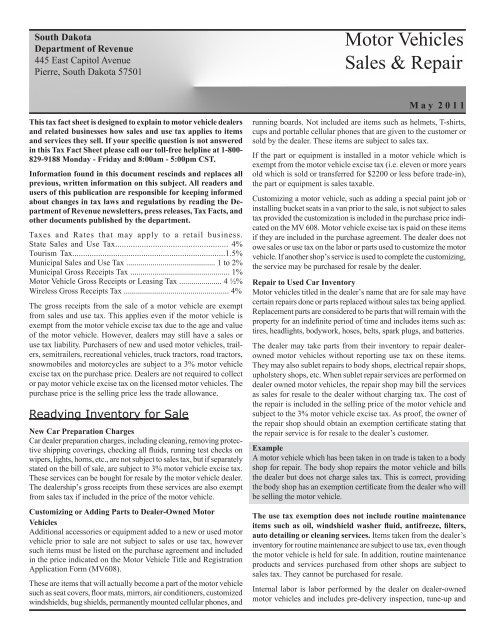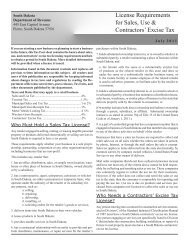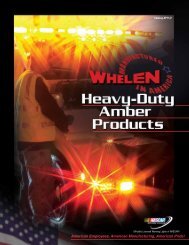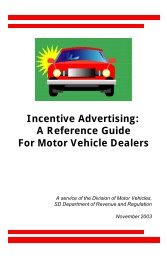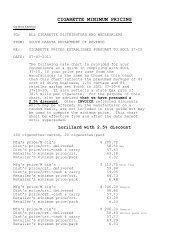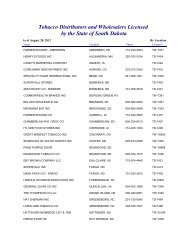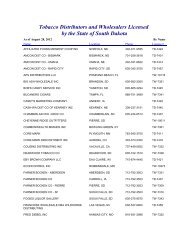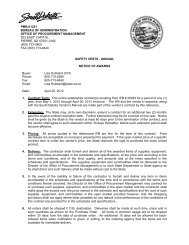Motor Vehicles Sales & Repair - State of South Dakota
Motor Vehicles Sales & Repair - State of South Dakota
Motor Vehicles Sales & Repair - State of South Dakota
You also want an ePaper? Increase the reach of your titles
YUMPU automatically turns print PDFs into web optimized ePapers that Google loves.
<strong>South</strong> <strong>Dakota</strong><br />
Department <strong>of</strong> Revenue<br />
445 East Capitol Avenue<br />
Pierre, <strong>South</strong> <strong>Dakota</strong> 57501<br />
This tax fact sheet is designed to explain to motor vehicle dealers<br />
and related businesses how sales and use tax applies to items<br />
and services they sell. If your specific question is not answered<br />
in this Tax Fact Sheet please call our toll-free helpline at 1-800-<br />
829-9188 Monday - Friday and 8:00am - 5:00pm CST.<br />
Information found in this document rescinds and replaces all<br />
previous, written information on this subject. All readers and<br />
users <strong>of</strong> this publication are responsible for keeping informed<br />
about changes in tax laws and regulations by reading the Department<br />
<strong>of</strong> Revenue newsletters, press releases, Tax Facts, and<br />
other documents published by the department.<br />
Taxes and Rates that may apply to a retail business.<br />
<strong>State</strong> <strong>Sales</strong> and Use Tax................................................... 4%<br />
Tourism Tax.......................................................................1.5%<br />
Municipal <strong>Sales</strong> and Use Tax ............................................ 1 to 2%<br />
Municipal Gross Receipts Tax ................................................. 1%<br />
<strong>Motor</strong> Vehicle Gross Receipts or Leasing Tax ..................... 4 ½%<br />
Wireless Gross Receipts Tax .................................................... 4%<br />
The gross receipts from the sale <strong>of</strong> a motor vehicle are exempt<br />
from sales and use tax. This applies even if the motor vehicle is<br />
exempt from the motor vehicle excise tax due to the age and value<br />
<strong>of</strong> the motor vehicle. However, dealers may still have a sales or<br />
use tax liability. Purchasers <strong>of</strong> new and used motor vehicles, trailers,<br />
semitrailers, recreational vehicles, truck tractors, road tractors,<br />
snowmobiles and motorcycles are subject to a 3% motor vehicle<br />
excise tax on the purchase price. Dealers are not required to collect<br />
or pay motor vehicle excise tax on the licensed motor vehicles. The<br />
purchase price is the selling price less the trade allowance.<br />
Readying Inventory for Sale<br />
New Car Preparation Charges<br />
Car dealer preparation charges, including cleaning, removing protective<br />
shipping coverings, checking all fluids, running test checks on<br />
wipers, lights, horns, etc., are not subject to sales tax, but if separately<br />
stated on the bill <strong>of</strong> sale, are subject to 3% motor vehicle excise tax.<br />
These services can be bought for resale by the motor vehicle dealer.<br />
The dealership’s gross receipts from these services are also exempt<br />
from sales tax if included in the price <strong>of</strong> the motor vehicle.<br />
Customizing or Adding Parts to Dealer-Owned <strong>Motor</strong><br />
<strong>Vehicles</strong><br />
Additional accessories or equipment added to a new or used motor<br />
vehicle prior to sale are not subject to sales or use tax, however<br />
such items must be listed on the purchase agreement and included<br />
in the price indicated on the <strong>Motor</strong> Vehicle Title and Registration<br />
Application Form (MV608).<br />
These are items that will actually become a part <strong>of</strong> the motor vehicle<br />
such as seat covers, floor mats, mirrors, air conditioners, customized<br />
windshields, bug shields, permanently mounted cellular phones, and<br />
<strong>Motor</strong> <strong>Vehicles</strong><br />
<strong>Sales</strong> & <strong>Repair</strong><br />
M a y 2 0 1 1<br />
running boards. Not included are items such as helmets, T-shirts,<br />
cups and portable cellular phones that are given to the customer or<br />
sold by the dealer. These items are subject to sales tax.<br />
If the part or equipment is installed in a motor vehicle which is<br />
exempt from the motor vehicle excise tax (i.e. eleven or more years<br />
old which is sold or transferred for $2200 or less before trade-in),<br />
the part or equipment is sales taxable.<br />
Customizing a motor vehicle, such as adding a special paint job or<br />
installing bucket seats in a van prior to the sale, is not subject to sales<br />
tax provided the customization is included in the purchase price indicated<br />
on the MV 608. <strong>Motor</strong> vehicle excise tax is paid on these items<br />
if they are included in the purchase agreement. The dealer does not<br />
owe sales or use tax on the labor or parts used to customize the motor<br />
vehicle. If another shop’s service is used to complete the customizing,<br />
the service may be purchased for resale by the dealer.<br />
<strong>Repair</strong> to Used Car Inventory<br />
<strong>Motor</strong> vehicles titled in the dealer’s name that are for sale may have<br />
certain repairs done or parts replaced without sales tax being applied.<br />
Replacement parts are considered to be parts that will remain with the<br />
property for an indefinite period <strong>of</strong> time and includes items such as:<br />
tires, headlights, bodywork, hoses, belts, spark plugs, and batteries.<br />
The dealer may take parts from their inventory to repair dealerowned<br />
motor vehicles without reporting use tax on these items.<br />
They may also sublet repairs to body shops, electrical repair shops,<br />
upholstery shops, etc. When sublet repair services are performed on<br />
dealer owned motor vehicles, the repair shop may bill the services<br />
as sales for resale to the dealer without charging tax. The cost <strong>of</strong><br />
the repair is included in the selling price <strong>of</strong> the motor vehicle and<br />
subject to the 3% motor vehicle excise tax. As pro<strong>of</strong>, the owner <strong>of</strong><br />
the repair shop should obtain an exemption certificate stating that<br />
the repair service is for resale to the dealer’s customer.<br />
Example<br />
A motor vehicle which has been taken in on trade is taken to a body<br />
shop for repair. The body shop repairs the motor vehicle and bills<br />
the dealer but does not charge sales tax. This is correct, providing<br />
the body shop has an exemption certificate from the dealer who will<br />
be selling the motor vehicle.<br />
The use tax exemption does not include routine maintenance<br />
items such as oil, windshield washer fluid, antifreeze, filters,<br />
auto detailing or cleaning services. Items taken from the dealer’s<br />
inventory for routine maintenance are subject to use tax, even though<br />
the motor vehicle is held for sale. In addition, routine maintenance<br />
products and services purchased from other shops are subject to<br />
sales tax. They cannot be purchased for resale.<br />
Internal labor is labor performed by the dealer on dealer-owned<br />
motor vehicles and includes pre-delivery inspection, tune-up and
<strong>Motor</strong> Vehicle <strong>Sales</strong> and <strong>Repair</strong><br />
cleaning <strong>of</strong> new motor vehicles, and tune-up and reconditioning <strong>of</strong><br />
used motor vehicles prior to displaying the motor vehicles for sale.<br />
Since the dealer receives no payment for internal labor performed,<br />
it is not sales or use taxable and should not be included in gross<br />
receipts.<br />
Many dealers have a bookkeeping or accounting system in which internal<br />
labor performed on such motor vehicles is billed to the motor vehicles.<br />
This billing is used only by the dealer in determining the cost <strong>of</strong> handling<br />
a motor vehicle. No payment is received for the labor and the labor should<br />
not be included in gross receipts. Since the labor is not reported in the<br />
gross receipts, no deduction may be taken on the sales tax return.<br />
NOTE: This does not apply to leased motor vehicles or motor<br />
vehicles the dealer or others are using. Parts used to repair leased<br />
motor vehicles or motor vehicles being used are subject to use<br />
tax on the dealer’s cost. If a charge is made to the lessee or any<br />
other party, the entire receipts are subject to sales tax.<br />
Warranties<br />
Manufacturer’s Warranty<br />
A manufacturer’s warranty is included in the price <strong>of</strong> the motor<br />
vehicle. Since there is no additional charge, this warranty is not<br />
subject to sales tax. Parts and labor furnished by a dealer to fulfill<br />
a warranty obligation <strong>of</strong> the manufacturer are not subject to sales<br />
tax provided the customer is not charged for such parts or labor.<br />
The dealer’s receipts from the manufacturer for warranty work are<br />
not taxable. The dealer does not owe use tax on parts taken from<br />
inventory used to complete manufacturer’s warranty work.<br />
• If a customer pays a deductible amount under the warranty, that<br />
payment is subject to sales tax.<br />
Any receipt from the customer or manufacturer for items not<br />
covered by the warranty are subject to sales tax.<br />
• If the dealer provides a loaner/rental vehicle to the<br />
customer, under warranty, and the dealer is reimbursed by the<br />
manufacturer the reimbursement is subject to the motor vehicles<br />
gross receipt tax and not subject to sales tax. However if<br />
the dealer is reimbursed by the customer, the reimbursement is<br />
subject to the sales tax and the motor vehicles gross receipts tax<br />
and the tourism tax.<br />
Extended Service Contracts (Extended Warranty)<br />
If an extended service contract is sold at the time <strong>of</strong> purchase <strong>of</strong> the<br />
vehicle, it is subject to 3% motor vehicle excise tax. If an extended<br />
service contract is sold to a customer at a later date, the sale is<br />
subject to sales tax.<br />
Mechanical Breakdown Insurance<br />
Premiums paid for insurance policies sold by independent insurance<br />
agents are not considered service contracts. These premiums<br />
are not subject to sales tax; however, they are subject to insurance<br />
premiums tax. All charges made to the insurance company for parts<br />
and labor are subject to sales tax. Parts or service which are paid by<br />
an insurance claim are subject to sales tax.<br />
If you have any doubt whether the service contracts you are selling<br />
are recognized as insurance or not, ask the company you are doing<br />
2<br />
business with to advise you <strong>of</strong> the status <strong>of</strong> their contracts.<br />
Implied Warranty<br />
If a dealer makes repairs at no charge to a customer’s motor vehicle<br />
after the sale, and those repairs are not covered by a written warranty,<br />
the dealer owes use tax on the cost <strong>of</strong> all parts installed in the<br />
customer’s motor vehicle.<br />
<strong>Repair</strong> and Body Shops<br />
<strong>Repair</strong> Services<br />
Services such as auto repair, body repair, and customizing which<br />
are not being purchased as a sale for resale, are subject to state and<br />
municipal sales tax. These services are taxed according to where the<br />
customer receives the service. If the item is picked up by the repair<br />
shop at the customer’s location or delivered to the customer’s location<br />
after the repair is completed, the tax applies at the customer’s<br />
location. If the repaired item is picked up at the repair shop, tax<br />
applies at the repair shop.<br />
Example<br />
A repair shop in Sioux Falls picks up a transmission in rural Minnehaha<br />
County and brings it to their shop for repair. After the repair<br />
is made, the transmission is delivered to the customer. Only the<br />
state tax applies as the repair was delivered to the customer in rural<br />
Minnehaha County.<br />
Resale Purchases<br />
Dealers can purchase services such as auto repair, body repair, towing<br />
and customizing services for resale when being purchased for<br />
either a customer’s motor vehicle or a dealer-owned motor vehicle<br />
that is for sale.<br />
Businesses hired to customize motor vehicles or add conversion<br />
packages to a motor vehicle that is for sale by a dealer will not<br />
owe sales tax if the dealer furnishes them with an exemption certificate.<br />
Dealers that are working on customer-owned motor vehicles,<br />
whether doing repair, detailing or customizing, may purchase another<br />
business’ services for resale, as these charges will be passed<br />
on to the customer and sales tax will be applied at that time.<br />
NOTE: Cleaning services for dealer-owned motor vehicles may<br />
not be purchased for resale, along with routine maintenance<br />
items such as oil, fluids, and filters.<br />
Towing Services<br />
Receipts from towing services are subject to state and city tax. The<br />
place the motor vehicle is towed to determines the tax to apply. If<br />
the motor vehicle is towed to a location outside <strong>South</strong> <strong>Dakota</strong>, <strong>South</strong><br />
<strong>Dakota</strong> sales tax will not apply to these receipts.<br />
Automotive Parts Wholesalers and Retailers<br />
Wholesalers and retailers <strong>of</strong> automotive supplies are liable for sales<br />
tax on their receipts from sales <strong>of</strong> auto shop equipment, welding shop<br />
equipment, wash rack supplies, hand tools, grinding compounds,<br />
sandpaper, wiping rags, brushes, soap, paint remover, tape, carburetor<br />
and brake cleaner, and other material and equipment which are<br />
sold to a garage or service station, when the supplies and equipment
are not to be resold by the garage or station. Wholesalers and retailers<br />
are liable for use tax on the supplies and equipment which they<br />
consume in rendering their service.<br />
Wholesalers and retailers that sell automotive parts, paints, paint<br />
thinner, lacquers, greases, lubricants, tire patches, cement, and items<br />
which become part <strong>of</strong> a motor vehicle may accept an exemption<br />
certificate for these items when sold to service stations, garages, or<br />
body shops. Such items are considered purchases for resale by the<br />
service station, garage, or body shop.<br />
When merchandise is delivered or shipped to a customer, the point<br />
where the customer receives the merchandise determines the tax rate.<br />
If merchandise is delivered to a customer location outside <strong>of</strong> <strong>South</strong><br />
<strong>Dakota</strong>, no <strong>South</strong> <strong>Dakota</strong> tax applies to the sale. If merchandise is<br />
delivered or shipped to a customer within <strong>South</strong> <strong>Dakota</strong>, the tax rate<br />
is determined by the location to which the merchandise is shipped.<br />
Many <strong>South</strong> <strong>Dakota</strong> municipalities impose a municipal tax. More<br />
information may be found in the Municipal Tax Bulletin, available<br />
on the department’s website at www.state.sd.us/drr.<br />
Delivery and Handling Fees<br />
Delivery and handling charges are subject to the same state and<br />
municipal sales tax rate as the merchandise when delivered to a<br />
customer in <strong>South</strong> <strong>Dakota</strong>. If the product is not taxable, the delivery<br />
and handling charges are not taxable.<br />
Delivery charges are the charges by the retailer for preparation and<br />
delivery to a location designated by the purchaser <strong>of</strong> tangible personal<br />
property or services. Delivery charges include transportation,<br />
shipping, postage, handling, crating, and packing.<br />
If a retailer hires a transportation company and bills the customer for<br />
the transportation service, the retailer must include the transportation<br />
charges in their taxable receipts.<br />
If both taxable and nontaxable products are in the same shipment,<br />
tax is due on the portion <strong>of</strong> the delivery charge for the taxable products.<br />
This is determined by using a percentage <strong>of</strong> the sales price or<br />
weight <strong>of</strong> the taxable property compared to the total sales or total<br />
weight <strong>of</strong> all property in the shipment.<br />
Examples<br />
1. A parts store in Sioux Falls ships a part to a customer in rural<br />
Minnehaha County. The parts store should charge the customer state<br />
sales tax and no municipal tax because the customer takes possession<br />
outside the city limits. <strong>Sales</strong> tax applies to the charge for the<br />
product and the delivery charge.<br />
2. A parts store in Sioux Falls sells 100 spark plugs to a parts store<br />
in Watertown, charging $100 for the spark plugs and a $5 delivery<br />
fee. The Sioux Falls store should obtain an exemption certificate<br />
from the Watertown store for its parts. No sales tax is due on the<br />
parts or delivery fee.<br />
3. Jones Auto sells and delivers the following items to Fred’s Farm<br />
Store in Pierre: 2 tires for resale (cost $1000) and 1 <strong>of</strong>fice desk for<br />
use by the owner (cost $1000). Jones bills Fred $2000 plus $200<br />
delivery. Fred’s gave Jones an exemption certificate for the two<br />
tires.<br />
3<br />
<strong>Motor</strong> Vehicle <strong>Sales</strong> and <strong>Repair</strong><br />
Jones charges state sales tax plus Pierre municipal sales tax<br />
on $1,100 ($1000 for the desk plus $100 shipping). Taxable<br />
shipping was determined by using the ratio <strong>of</strong> taxable products<br />
($1000) to total sale ($2000). 1/2 <strong>of</strong> the shipping is taxable.<br />
Use Tax<br />
All supplies and services purchased by a business that are not being<br />
resold to a customer are subject to use tax, if sales tax was not<br />
paid on the purchase. Cost <strong>of</strong> items subject to use tax should be<br />
reported on the use tax line <strong>of</strong> the sales tax return. This includes<br />
items such as:<br />
attorney/accountant services <strong>of</strong>fice supplies<br />
brake cleaner paint brushes/sprayers<br />
brochures paint remover<br />
carburetor cleaner personnel training<br />
cleaning compounds promotional items<br />
computers rags<br />
computer support services sandpaper<br />
consulting services security services<br />
contract labor shop equipment<br />
furniture s<strong>of</strong>tware<br />
grinding compounds solvent soap<br />
Internet services subscriptions<br />
janitorial supplies technician testing<br />
services manufacturer supply tools/hand tools<br />
services (parts locator) uniforms<br />
masking tape wash rack supplies/eqpmt.<br />
mops/brooms welding shop tools<br />
Use tax is also due on regular maintenance items, such as filters, oil,<br />
other fluids, and brake, engine and carburetor cleaners that are used<br />
on dealer-owned motor vehicles that are for resale. Use tax is due<br />
on all parts and services purchased to repair motor vehicles that are<br />
lease motor vehicles, even if they are not currently being leased.<br />
The fact that an additional charge may be added to a repair bill to<br />
cover costs <strong>of</strong> the supplies consumed does not relieve the dealer<br />
from his liability for the tax on such property used or consumed in<br />
the operation <strong>of</strong> his business.<br />
The following example is <strong>of</strong> a situation in which an additional<br />
charge is paid by the customer to cover the dealer’s cost on the<br />
property. Property which becomes part <strong>of</strong> a motor vehicle prior to<br />
title passing from the dealer to the customer, such as automotive<br />
parts, paints, paint thinner, lacquers, greases, lubricants, tire patches,<br />
and cement may be purchased for resale without paying the sales<br />
tax, provided the dealer furnishes the supplier with an exemption<br />
certificate showing his sales tax license number.<br />
Example<br />
ABC Dealership and XYZ <strong>Repair</strong> Shop both charge an additional<br />
5% for shop supplies on all repair invoices issued to customers<br />
to cover the cost <strong>of</strong> the rags, cleaners, masking tape, etc. they<br />
use in the course <strong>of</strong> their repair work. Both businesses must pay<br />
sales tax on these supplies at the time <strong>of</strong> purchase and include<br />
the 5% in the taxable sales to the customer.
<strong>Motor</strong> Vehicle <strong>Sales</strong> and <strong>Repair</strong><br />
Mounted Equipment<br />
Truck boxes, hoists, digger equipment, feed mixers, corn shellers<br />
or similar equipment are considered mounted equipment. If the<br />
mounted equipment is sold separately and added after the sale <strong>of</strong> the<br />
motor vehicle, both the equipment and the installation charges are<br />
subject to sales tax. If the mounted equipment is part <strong>of</strong> the motor<br />
vehicle, bought and mounted prior to the sale and included in the<br />
sale price, the equipment is subject to the 3% motor vehicle excise<br />
tax and is not sales taxable. This applies to both new and used motor<br />
vehicles and mounted equipment.<br />
Example<br />
Smith buys a truck for $12,000 then registers and licenses the motor<br />
vehicle. He pays the 3% motor vehicle excise tax on $12,000. He<br />
then buys a cement mixer and has it mounted on the truck. He pays<br />
sales tax on the mixer and installation charges.<br />
Smith buys a truck worth $12,000 with a cement mixer worth<br />
$8,000 from a dealer and pays $20,000 for the whole unit. He then<br />
registers and licenses the motor vehicle. He pays no sales tax on<br />
the mounted equipment, but pays the 3% excise tax on the purchase<br />
price or $20,000.<br />
Exceptions from the 3% motor vehicle excise tax—these items may<br />
be titled but are subject to sales and use tax. Pro<strong>of</strong> that sales tax was<br />
paid must be provided before the title will be issued.<br />
barbecue pits stump grinders<br />
car dollies tar pots<br />
log splitters trailers for air compressors<br />
small pull-type cement mixers tree chippers/tree spaces<br />
street sweepers welders<br />
jeep boosters<br />
Boats<br />
For information on taxes and boats, view the Boats Tax Facts at<br />
www.state.sd.us/drr or request a copy by calling 1-800-829-9188.<br />
All Terrain <strong>Vehicles</strong> (ATV’s)<br />
All terrain vehicles are subject to sales tax, no matter what the<br />
intended use <strong>of</strong> the vehicle. <strong>Sales</strong> tax applies to ATVs that are<br />
intended for <strong>of</strong>f-road and on-road use. ATVs purchased for exclusive<br />
agricultural purposes are subject to the 4% state sales tax, no<br />
municipal tax. An exemption certificate must be obtained from the<br />
purchaser to document the ATV is for agricultural use. The rental<br />
<strong>of</strong> ATV’s is subject to state sales tax, applicable municipal tax, plus<br />
tourism tax if rented for 28 days or less.<br />
Snowmobiles and Low-Speed<br />
<strong>Vehicles</strong><br />
Snowmobiles and low-speed vehicles (LVS) are subject to the 3%<br />
motor vehicle excise tax in lieu <strong>of</strong> sales tax and must be titled and<br />
registered with the county treasurer.<br />
“Low-speed vehicle,” (LSV) a 4-wheeled vehicle whose speed<br />
4<br />
attainable in 1 mile is more than 20 miles per hour and not more<br />
than 25 miles per hour on a paved level surface. The manufacturer’s<br />
certificate <strong>of</strong> origin or title must clearly identify the vehicle as a<br />
low-speed vehicle. A LSV is used primarily for short trips and recreational<br />
purposes, and has some safety equipment such as lights,<br />
reflectors, mirrors, parking brake, windshield, and safety belts.<br />
Accessories such as helmets are subject to sales tax.<br />
Converting <strong>Motor</strong> <strong>Vehicles</strong> to Alternative<br />
Fuels<br />
Parts and labor required to convert a motor vehicle to run on compressed<br />
natural gas or mixtures containing 85% or more alcohol are<br />
subject to sales and use tax.<br />
Commissions<br />
Commission or fees received by retailer for arranging a loan between<br />
the buyer <strong>of</strong> the retailer’s product and a lending institution are not<br />
subject to sales tax.<br />
Driving Services<br />
When a dealer hires a person to drive a motor vehicle from one<br />
location to another, the services <strong>of</strong> the driver are subject to sales<br />
tax. Dealers are responsible for remitting use tax on these services<br />
if the driver does not have a sales tax license.
Other Fees and Options<br />
5<br />
<strong>Motor</strong> Vehicle <strong>Sales</strong> and <strong>Repair</strong><br />
The customer may choose to purchase additional services when purchasing a motor vehicle. The chart shows examples <strong>of</strong> services and<br />
products that may be sold by vehicle dealers and the tax application.<br />
Description Subject to 3% <strong>Motor</strong><br />
Vehicle Excise Tax<br />
Certification Charge X<br />
Delivery Fee X<br />
Documentation Fee - Included in Sale Price X<br />
Subject to <strong>Sales</strong><br />
Tax<br />
Documentation Fee - Not Included in Sale Price X<br />
Interest Charges Exempt Exempt<br />
New Car Preparation Charges - Included in <strong>Sales</strong> Price X<br />
Optional Contracts<br />
Credit Life & Disability Insurance - subject to insurance premium tax. Exempt Exempt<br />
Debt Protection Plan - sold at time <strong>of</strong> vehicle purchase X<br />
Extended Service Contract/Extended Warranty -<br />
� sold at time <strong>of</strong> vehicle purchase X<br />
� sold after vehicle purchase X<br />
GAP Waiver - agreement from finance company to waive the loan value that is greater than the<br />
value <strong>of</strong> the vehicle if the vehicle is wrecked before the loan is paid <strong>of</strong>f.<br />
GAP Insurance - subject to insurance premium tax. Exempt Exempt<br />
Lease Wear Care or Protection Plans - on lease vehicles pays for damages such as scratches<br />
and dents<br />
Maintenance Care Contracts (may include oil and filter changes, antifreeze, tire rotations, chassis<br />
lubrications, inspections <strong>of</strong> safety and mechanical components, etc.)<br />
Mechanical Breakdown Insurance - subject to insurance premium tax. Exempt Exempt<br />
Other Optional Contracts - roadside assistance plans, tire and wheel repair plans, windshield<br />
repair plans, bent & dent dealer options, key replacement plans, trip interruption protection<br />
plans<br />
Optional Products<br />
Crystal Fusion:<br />
� added to vehicle prior to purchase <strong>of</strong> vehicle X<br />
� added to vehicle after purchase <strong>of</strong> vehicle X<br />
Electric MV Connector X<br />
Lo Jack (hidden transmitter added to vehicle to track and recover if stolen):<br />
� added to vehicle prior to purchase <strong>of</strong> vehicle X<br />
� added to vehicle after purchase <strong>of</strong> vehicle X<br />
Polyshield<br />
� added to vehicle prior to purchase <strong>of</strong> vehicle X<br />
� added to vehicle after purchase <strong>of</strong> vehicle X<br />
Starter Interrupter Devices X<br />
Theft Etch:<br />
� added to vehicle prior to purchase <strong>of</strong> vehicle X<br />
� added to vehicle after purchase <strong>of</strong> vehicle X<br />
Windshield enhancements:<br />
� added to vehicle prior to purchase <strong>of</strong> vehicle X<br />
� added to vehicle after purchase <strong>of</strong> vehicle X<br />
X<br />
X<br />
X<br />
X
<strong>Motor</strong> Vehicle <strong>Sales</strong> and <strong>Repair</strong><br />
<strong>Motor</strong> Vehicle Lease & Renting<br />
Taxes are based on the amount <strong>of</strong> the rental payments. The state<br />
and municipal tax applies based on where the vehicle is delivered<br />
to the customer.<br />
1. Automobiles, pickups or vans rented for 28 days or less, which<br />
are licensed under the noncommercial licensee fee schedule per<br />
SDCL 32-5-6 and have a manufacturer shipping weight, including<br />
accessories, <strong>of</strong> 10,000 pounds or less, are subject to the following<br />
taxes:<br />
• <strong>State</strong> sales tax<br />
• Municipal sales tax<br />
• <strong>Motor</strong> vehicle gross receipts tax<br />
• Tourism tax<br />
Charges for the following items are subject to the same tax as the<br />
rental <strong>of</strong> the vehicle whether itemized or included in the car rental<br />
fee.<br />
• Airport concession fees and facility fees<br />
• Drop Charges<br />
• Child seat<br />
• Ski racks<br />
• Car navigational (GPS) system<br />
• Additional driver<br />
• Drivers 24 years or younger<br />
• Exceeding mileage<br />
• Up charges for nonstandard vehicles<br />
• Car Satellite radio<br />
• Frequent Flyer Surcharge<br />
• Fuel and Service Charges<br />
• Fuel Purchase Option<br />
• Loss Damage Waiver<br />
• Energy Surcharges<br />
• Emergency Roadside Service<br />
• Vehicle licensing fees passed onto customer<br />
• Rental tax surcharges<br />
A car rental company does not owe sales tax on insurance premiums<br />
paid for insurance they sell to customers when the following<br />
criteria are met:<br />
a. The insurance is from a licensed insurance company;<br />
b. The entire amount charged the customer for the premium<br />
is subject to insurance premiums tax; and<br />
c. The charge is itemized on the customer’s invoice.<br />
If the charge to the customer for the insurance is greater than the<br />
amount the insurance company pays insurance premiums tax on,<br />
the entire charge is subject to sales tax.<br />
2. Trailers with an unladen weight <strong>of</strong> 9,000 pounds or more are<br />
subject to the following taxes:<br />
A. If rented for 28 days or less:<br />
• <strong>State</strong> sales tax<br />
• Municipal tax<br />
• <strong>Motor</strong> vehicle gross receipts tax<br />
Tourism tax does not apply.<br />
6<br />
B. If rented for more than 28 days but less than 6 months:<br />
• <strong>Motor</strong> vehicle gross receipts tax<br />
3. Recreational vehicles, when rented for 28 days or less, including<br />
ATV’s, recreational vehicles, camping trailers, snowmobiles, snowmobile<br />
trailers, mopeds, motorcycles, motor coaches, watercraft and<br />
watercraft trailers, are subject to the following taxes:<br />
• <strong>State</strong> sales tax<br />
• Municipal sales tax<br />
• Tourism tax<br />
4. All motor vehicles, other than the above categories, rented for<br />
28 days or less are subject to the 4% state sales tax and municipal<br />
tax.<br />
Report the motor vehicle gross receipts tax and tourism tax in the<br />
city and special jurisdiction section <strong>of</strong> the sales tax return, using<br />
the following codes:<br />
<strong>Motor</strong> vehicle gross receipts tax: code 600-1.<br />
Tourism tax: code 700-1.<br />
<strong>Motor</strong> Vehicle Leasing<br />
Leases <strong>of</strong> motor vehicles, without an operator or driver, for more<br />
than 28 days are not subject to sales tax, gross receipts tax or tourism<br />
tax. These motor vehicles are subject to the 3% motor vehicle<br />
excise tax which is assessed at the time <strong>of</strong> registration based on the<br />
purchase price <strong>of</strong> the vehicle.<br />
<strong>Motor</strong> vehicles removed from short term rental (28 or fewer days)<br />
and leased for more than 28 days, are subject to the 3% motor vehicle<br />
excise tax. If the same vehicle is later leased for 28 days or<br />
less, it is subject to the sales tax, motor vehicle gross receipts tax<br />
and applicable municipal tax. The short term rental <strong>of</strong> automobiles,<br />
pickups and vans are also subject to tourism tax.<br />
The lessor or the lessee must pay the 3% excise tax on the purchase<br />
price <strong>of</strong> the vehicle with a gross vehicle weight rating <strong>of</strong> less than<br />
16,000 pounds or fertilizer vehicles if leased more than 28 days.<br />
(<strong>Motor</strong>cycles and motorized bicycles are included.)<br />
• The lessor must title and license the vehicle. In the case<br />
<strong>of</strong> a leasing company within a dealership, the leasing<br />
company name must be separate and distinct from that <strong>of</strong><br />
the dealership.<br />
• The lessor and the lessee’s name must appear on the title.<br />
• The <strong>South</strong> <strong>Dakota</strong> driver’s license or Social Security number<br />
<strong>of</strong> each lessee must be given. If the lessee is a business,<br />
a FEIN is required (in the event <strong>of</strong> sole proprietorship <strong>of</strong><br />
the business, the owner’s SDDL or SSN may be used).<br />
• The lessor or the lessee must pay the 3% excise tax on the<br />
purchase price <strong>of</strong> the vehicle (with a gross vehicle weight<br />
rating <strong>of</strong> less than 16,000 pounds or fertilizer vehicles).<br />
Purchase price on a closed leased (a lease that has an established<br />
term) vehicle is the total consideration whether<br />
received in money or otherwise. Total consideration is: all<br />
lease payments, including cash, rebates, the net trade-in,<br />
extended warranties, administrative fees, acquisition fees,<br />
or any other fees assessed on the purchase <strong>of</strong> the vehicle.
Total consideration does not include: title fees, registration<br />
fees, vehicle excise tax, federal excise tax attributable to the<br />
sale <strong>of</strong> the vehicle to the owner or to the lease <strong>of</strong> the vehicle<br />
by the owner, insurance, and refundable deposits.<br />
• Calculation <strong>of</strong> the tax shall be done on the <strong>South</strong> <strong>Dakota</strong><br />
Closed Lease Tax Worksheet. A copy <strong>of</strong> the worksheet<br />
must accompany the application for title and registration<br />
(MV608). The purchase price must be certified on the<br />
application for title and registration (MV608) or the lease<br />
tax worksheet.<br />
• If the lessee buys the vehicle at the end <strong>of</strong> the lease, excise<br />
tax is assessed on the purchase price <strong>of</strong> the vehicle at the<br />
end <strong>of</strong> the lease.<br />
• The lessor/dealer must assign the title to the lessee and<br />
submit the assigned title to the lessee’s county treasurer,<br />
along with an application certifying the purchase price <strong>of</strong><br />
the vehicle.<br />
• If a lease is terminated prior to the termination date contained<br />
in the lease agreement, no refund is given for tax<br />
previously paid.<br />
Leased Vehicle-Destroyed<br />
If prior to the expiration <strong>of</strong> a lease, the leased vehicle is destroyed by<br />
fire, accident or vandalism to the extent that it constitutes a total loss<br />
<strong>of</strong> the vehicle, credit for the lease tax paid for the period remaining<br />
on the previous lease is allowed if another vehicle is substituted<br />
under the original lease or a new lease is executed with the intent<br />
to replace the vehicle subject to the previous lease.<br />
The new lease or substituted vehicle under the original lease must<br />
be executed by the same lessor and lessee for lease <strong>of</strong> a vehicle <strong>of</strong><br />
the same or similar make, model, year and options as the vehicle<br />
the vehicle and the required fees and taxes.<br />
• A lessee who entered into a lease prior to July 1, 2000,<br />
and who paid excise tax based on the purchase price <strong>of</strong><br />
the vehicle, including the value <strong>of</strong> the leased vehicle at<br />
the end <strong>of</strong> the lease shall receive credit for tax previously<br />
paid if the lessee purchases the vehicle at the end <strong>of</strong> the<br />
lease.subject to the previous lease. The lease must be for<br />
the remaining lease period as the previous lease, for the<br />
same lease price and under the same lease terms as the<br />
previous lease.<br />
Out-<strong>of</strong>-<strong>State</strong> Vehicle Lease<br />
Leased vehicles entering the state under a lease are subject to tax<br />
on the date the vehicle enters this state for the remaining months<br />
in the lease period.<br />
Credit is given for tax that has been paid up-front to another state.<br />
The applicant must submit pro<strong>of</strong> <strong>of</strong> payment <strong>of</strong> the tax. The lessee<br />
and the lessor must remain the same. [No credit is given if<br />
payment <strong>of</strong> the tax on a lease was being made to another state on<br />
a monthly basis.]<br />
In the event tax was being paid by the lessee to another state on<br />
a monthly basis, the county treasurer shall require the leasing<br />
company making application for title and license to submit a completed<br />
application for title and registration, a <strong>South</strong> <strong>Dakota</strong> Lease<br />
7<br />
<strong>Motor</strong> Vehicle <strong>Sales</strong> and <strong>Repair</strong><br />
Tax Worksheet For Out-Of-<strong>State</strong> Vehicle Lease, and a copy <strong>of</strong> the<br />
lease agreement.<br />
Open-end Leases<br />
An open-end lease is one in which the terms <strong>of</strong> the lease are not<br />
certain at the time the lease contract is executed. The purchase<br />
price on an open-end lease is defined as: the purchase price <strong>of</strong> the<br />
vehicle plus cash, rebates, the net trade-in, extended warranties,<br />
administrative fees, acquisition fees, or any other fees assessed on<br />
the purchase <strong>of</strong> the vehicle. The purchase price does not include<br />
title fees, registration fees, vehicle excise tax federal excise taxes<br />
attributable to the sale <strong>of</strong> the vehicle to the owner or to the lease<br />
<strong>of</strong> the vehicle by the owner, insurance and refundable deposits. No<br />
tax worksheet is required on this type <strong>of</strong> lease. The purchase price<br />
<strong>of</strong> the vehicle is certified by the dealer on the application for title<br />
(MV 608) or a purchase order must be submitted to substantiate the<br />
vehicle’s purchase price.<br />
Extended Leases or Additional Consideration<br />
If a lease is extended or there is additional consideration paid for<br />
the lease, the lessor is responsible for remitting the 3% motor vehicle<br />
excise tax. The <strong>South</strong> <strong>Dakota</strong> Extended Lease or Additional<br />
Consideration Lease Tax Worksheet along with the additional tax<br />
payment is to be remitted through the County Treasurer’s <strong>of</strong>fice <strong>of</strong><br />
the county in which the vehicle is registered. The certificate <strong>of</strong> title<br />
on the vehicle does not have to be submitted.<br />
Talk to Us!<br />
If you have a tax problem or question, call the <strong>South</strong> <strong>Dakota</strong> Department<br />
<strong>of</strong> Revenue toll-free at 1-800-829-9188. Visit us on the<br />
web at www.state.sd.us/drr, email us at bustax@state.sd.us or<br />
write us:<br />
Aberdeen<br />
419 Moccasin Drive<br />
Aberdeen, SD 57401-5085<br />
Mitchell<br />
417 N. Main, Suite 112<br />
Mitchell, SD 57301-2600<br />
Rapid City<br />
4447 S. Canyon Road, Suite 6<br />
Rapid City, SD 57702-1889<br />
SD Department <strong>of</strong> Revenue<br />
445 East Capitol Ave.<br />
Pierre, SD 57501-3100<br />
Sioux Falls<br />
300 S. Sycamore, Suite 102<br />
Sioux Falls, SD 57110<br />
Watertown<br />
1505 10th Avenue SE, Suite 1<br />
Watertown, SD 57201-5300<br />
Yankton<br />
1900 Summit Street<br />
Yankton, SD 57078


